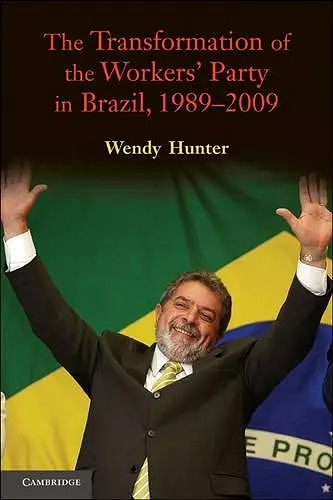The Transformation of the Workers' Party in Brazil, 1989–2009
Format:Paperback
Publisher:Cambridge University Press
Published:13th Sep '10
Currently unavailable, and unfortunately no date known when it will be back
This paperback is available in another edition too:
- Hardback£49.00(9780521514552)

This book explores the factors that stimulated and supported the Workers' Party's electoral expansion in Brazil since the late 1980s.
This book explores the factors that stimulated and supported the Workers' Party's electoral expansion in Brazil since the late 1980s, and explores the consequences of this growth for the party itself and for Brazilian politics more broadly.Drawing on historical institutionalism and strategic frameworks, this book analyzes the evolution of the Workers' Party between 1989, the year of Lula's first presidential bid, and 2009, when his second presidential term entered its final stretch. The book's primary purpose is to understand why and how the once-radical Partido dos Trabalhadores (PT) moderated the programmatic positions it endorsed and adopted other aspects of a more catch-all electoral strategy, thereby increasing its electoral appeal. At the same time, the book seeks to shed light on why some of the PT's distinctive normative commitments and organizational practices have endured in the face of adaptations aimed at expanding the party's vote share. The conclusion asks whether, in the face of these changes and continuities, the PT can still be considered a mass organized party of the left.
“The transformation of the once-radical Brazilian Workers’ Party into a major electoral force and highly successful social democratic party of government is one of the great stories of contemporary Latin American politics. How and why the PT made this impressive change over the course of two eventful decades and, in the process, changed Brazil is a story that has been waiting to be told and one that Wendy Hunter tells beautifully in this definitive account.” —Frances Hagopian, Harvard University
“Hunter’s study is instructive not only for specialists of Latin American politics, but also for students of comparative party analysis. She demonstrates how imperatives of party competition and the stickiness of past organizational and activist commitments jointly shape the strategic trajectory of partisan politics.” —Herbert Kitschelt, Duke University
“The Transformation of the Workers’ Party in Brazil will emerge as the leading work on the PT’s transformation from a radical grassroots-oriented party into a governing party. Combining rational choice and historical institutionalist approaches, Hunter shows how the PT’s powerful mass organization simultaneously slowed its adaptation to a changing electoral environment and facilitated its long term survival. The book also draws our attention to the under-studied role of leadership in party change. Rigorously researched and theoretically innovative, Hunter’s book will be of interest not only to scholars of Latin American politics but also to anyone interested in the causes and consequences of party change.” —Steven Levitsky, Harvard University
“The Transformation of the Workers’ Party in Brazil is an outstanding theoretical and empirical contribution to the literatures on political parties, organizational change and continuity, and Brazilian politics. Drawing on insights from both rational actor and historical institutional perspectives, Wendy Hunter explains why the Workers’ Party underwent deep programmatic and ideological change while at the same time preserving many of its internal organizational features. Hunter draws on these two theoretical paradigms, which most scholars treat as competing rather than complementary, in original and convincing ways.” —Scott Mainwaring, University of Notre Dame
“The PT has long been one of Latin America’s most innovative political parties. In this superb book, Wendy Hunter provides the first comprehensive scholarly account of the party’s rise to power at the turn of the century. Skillfully weaving together insights from rational actor and historical institutionalist perspectives, Hunter explains why the PT was forced to moderate its leftist agenda as Lula approached the presidency, and how the party combined elements of change and continuity as it gained ground in municipal governments, the national congress, and presidential elections. This book is a must-read for anyone who seeks to understand both the challenges and opportunities encountered by leftist parties in contemporary Latin American democracies.” —Kenneth M. Roberts, Cornell University
ISBN: 9780521733007
Dimensions: 226mm x 152mm x 18mm
Weight: 360g
254 pages